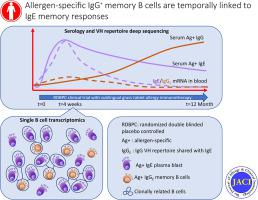Journal of Allergy and Clinical Immunology ( IF 14.2 ) Pub Date : 2019-12-27 , DOI: 10.1016/j.jaci.2019.11.046 Ilka Hoof 1 , Veronique Schulten 2 , Janice A Layhadi 3 , Thomas Stranzl 1 , Lars H Christensen 1 , Sara Herrera de la Mata 2 , Grégory Seumois 2 , Pandurangan Vijayanand 2 , Claus Lundegaard 1 , Kristoffer Niss 1 , Anders Lund 1 , Johanne Ahrenfeldt 1 , Jens Holm 1 , Esther Steveling 3 , Hanisah Sharif 3 , Stephen R Durham 3 , Björn Peters 2 , Mohamed H Shamji 3 , Peter S Andersen 1

|
Background
IgE is the least abundant immunoglobulin and tightly regulated, and IgE-producing B cells are rare. The cellular origin and evolution of IgE responses are poorly understood.
Objective
The cellular and clonal origin of IgE memory responses following mucosal allergen exposure by sublingual immunotherapy (SLIT) were investigated.
Methods
In a randomized double-blind, placebo-controlled, time course SLIT study, PBMCs and nasal biopsy samples were collected from 40 adults with seasonal allergic rhinitis at baseline and at 4, 8, 16, 28, and 52 weeks. RNA was extracted from PBMCs, sorted B cells, and nasal biopsy samples for heavy chain variable gene repertoire sequencing. Moreover, mAbs were derived from single B-cell transcriptomes.
Results
Combining heavy chain variable gene repertoire sequencing and single-cell transcriptomics yielded direct evidence of a parallel boost of 2 clonally and functionally related B-cell subsets of short-lived IgE+ plasmablasts and IgG+ memory B cells. Mucosal grass pollen allergen exposure by SLIT resulted in highly diverse IgE and IgGE repertoires. These were extensively mutated and appeared relatively stable as per heavy chain isotype, somatic hypermutations, and clonal composition. Single IgGE+ memory B-cell and IgE+ preplasmablast transcriptomes encoded antibodies that were specific for major grass pollen allergens and able to elicit basophil activation at very low allergen concentrations.
Conclusion
For the first time, we have shown that on mucosal allergen exposure, human IgE memory resides in allergen-specific IgG+ memory B cells. These cells rapidly switch isotype, expand into short-lived IgE+ plasmablasts, and serve as a potential target for therapeutic intervention.
中文翻译:

过敏原特异性IgG +记忆B细胞在时间上与IgE记忆反应相关。
背景
IgE是最不丰富的免疫球蛋白,并且受到严格调节,而产生IgE的B细胞很少见。对IgE反应的细胞起源和进化了解甚少。
客观的
通过舌下免疫疗法(SLIT)研究了粘膜变应原暴露后IgE记忆反应的细胞和克隆起源。
方法
在一项随机,双盲,安慰剂对照,时程SLIT研究中,从基线和第4、8、16、28和52周时从40名患有季节性过敏性鼻炎的成年人中收集了PBMC和鼻腔活检样品。从PBMC,分选的B细胞和鼻活检样本中提取RNA,以进行重链可变基因谱库测序。此外,mAb来源于单个B细胞转录组。
结果
重链可变基因库测序和单细胞转录组学的结合产生了直接证据,表明短期存活的IgE +浆母细胞和IgG +记忆B细胞的2个克隆和功能相关的B细胞亚群平行增强。SLIT暴露的粘膜草花粉过敏原导致了IgE和IgG E的多样性。根据重链同种型,体细胞超突变和克隆组成,它们被广泛地突变并显得相对稳定。单个IgG E +记忆B细胞和IgE +浆母细胞转录组编码的抗体对主要草花粉过敏原具有特异性,并能在非常低的过敏原浓度下引发嗜碱性粒细胞活化。
结论
首次,我们证明了在粘膜变应原暴露下,人IgE记忆驻留在变应原特异性IgG +记忆B细胞中。这些细胞迅速转换同种型,扩增为短寿命的IgE +成浆细胞,并成为治疗干预的潜在靶标。


























 京公网安备 11010802027423号
京公网安备 11010802027423号